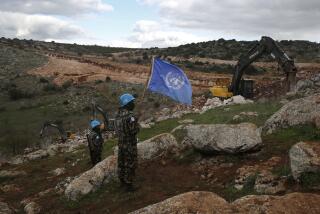Yugoslavia to Get More Truce Observers : Civil war: Diplomats hope that both Serbs and Croats have had enough of bloodshed.
- Share via
ZAGREB, Croatia — As a further indication that officials in Yugoslavia have reached a new determination to halt the fighting in Croatia, the leaders of Serbia, Croatia and the federal army chief have agreed to increase the number of European Community cease-fire observers here.
The head of the observer team here, Henri Wijnaendts of the Netherlands, also announced Thursday in Zagreb that the special white-clad EC observers will be dispatched to the volatile republic of Bosnia-Herzegovina, Croatia’s neighbor to the south, where clashes have been reported.
Wijnaendts did not say how many more EC observers would join the 200 already in Croatia, but he indicated that discussions between political and military leaders were progressing, giving a further boost to hopes that the present cease-fire, in its fifth day, would finally hold.
He said he has been conducting a round of shuttle diplomacy between Serbia’s hard-line president, Slobodan Milosevic; the federal defense minister, Gen. Veljko Kadijevic; and the Croatian president, Franjo Tudjman.
The cease-fire, the fifth since fighting began in late July a month after Croatia declared its independence, has held longer than any of the previous ones, giving rise to hopes among diplomats that both sides have had enough of the bloodshed, which has claimed more than 500 lives.
Wijnaendts’ announcement in Zagreb came a day after the U.N. Security Council voted 15-0 to impose a worldwide arms embargo on Yugoslavia, castigated the federal army for its role in the fighting and called for an immediate cessation of hostilities.
Most observers here say they doubt that the arms embargo, in itself, will have much impact on the conflict, since a large part of the arms and ammunition employed so far has come from the stockpiles of the Yugoslav army, which, with 180,000 men, is the fifth-largest army in Europe. Yugoslavia has a sizable arms industry of its own. An EC arms embargo has been in place for weeks, and had hampered Croatia’s ability to purchase weapons. Indeed, some analysts now say, Croatia’s military weakness may have worked to prolong the fighting.
But the military balance shifted abruptly last weekend when Croatian national guard forces began to take control of arms and equipment stockpiled at blockaded federal military bases inside Croatia.
Croatian government sources point to a seizure Sunday of about 50 tanks, 60 armored personnel carriers and stockpiles of heavy weapons and anti-tank missiles, held at a blockaded army barracks in Varazdin, as a turning point. Only hours after that seizure was announced, Kadijevic and Tudjman agreed to call a cease-fire.
Military specialists hasten to note that the Croatian side is still heavily outgunned by the combined force of the federal army and Serbian guerrillas, but they note that the Croatian national guard units are now capable of inflicting heavy damage themselves.
On Thursday, the army pulled out of the Croatian town of Vinkovci. The town, and the besieged barracks there, was the scene of heavy fighting for days.
Some army units were also preparing for at least a partial withdrawal from the mountainous Mostar district in Bosnia-Herzegovina.
In Washington, a State Department spokesman said the United States is “actively looking into” an accusation that the federal army had used poison gases in recent clashes in Croatia. The charge was made by Yugoslav President Stipe Mesic, a Croat, in a phone call to a Senate Foreign Relations Committee staff member, a panel spokesman said. Mesic, a Croat, is to testify before the committee today.
The Yugoslav Embassy in Washington said its military attache “categorically denied the accusations” and said there is no poison in the Yugoslav arsenal.
More to Read
Sign up for Essential California
The most important California stories and recommendations in your inbox every morning.
You may occasionally receive promotional content from the Los Angeles Times.










